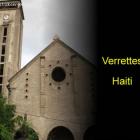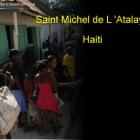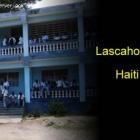Etang Saumâtre also known as Lac Azuéi (Lake Azuéi)
ADVERTISEMENT
Found in what is described as the arid part of the Cul-de-Sac valley, the pond can be found less than 30 km east of the Haitian capital in the Ouest Department. At its northern side, it forms part of the border with the Dominican Republic.
The landlocked lake is home to many endemic species of animals, reptiles, invertebrates and fishes, as well as being a habitat for flora, making it not so similar to the Dead Sea after all. It shares a pool of species with the twin lakes which are close to it in proximity as well as history.
Among its wildlife there are various fishes, including tilapia, over a hundred species of waterfowl like the flamingo, as well as turtles, Rhinoceros Iguanas and crocodiles. The habitat continues to teem with life because of its relatively stable state despite the spate of deforestation and soil erosion taking place around it. There is, however, a threat of eutrophication from algae and the problem of solid waste. There is also no program for waste management at the lake. Both governments have, however, identified possibilities for the continued preservation of the site.
Read more: Etang Saumatre, Environment, Lake Azuei, fish, Lac Azuéi, Azuéi, Tilapia, Turtle, Rhinoceros Iguanas, Iguanas, Crocodile, Flamingo, Haiti
« River Macassia | Main | Pine forest (Forêt des Pins) in Danger of Extinction »
Leave a Reply
Name (required) E-mail (required, will not be published)
» »
Our objective is to share with you news and information about Haiti and the people of Haiti. Traditions, habits and the way we were or grew are alive in this site. We highly recommend that you Subscribe to our Newsletter and also share with us some of the things that are memorable and made us unique people.


 Verrettes, Haiti
Verrettes, Haiti  Something to think about
Something to think about  Saint Michel de L 'Atalaye
Saint Michel de L 'Atalaye  Lascahobas, Haiti
Lascahobas, Haiti  Informative Marketing and Advertising in the Haitian Community
Informative Marketing and Advertising in the Haitian Community